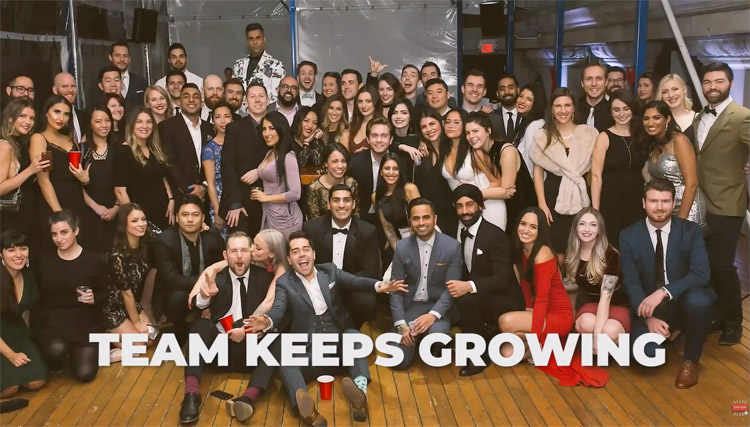
A former contributor to Daily Hive predecessor Vancity Buzz is set to face off with the website’s parent company in a Vancouver courtroom this month as part of a years-long effort to get paid for work done back in 2013.
Bartosz Bos, who wrote under the pseudonym “Hipster Designer,” originally filed a Small Claims Court action against Buzz Connected Media Inc. in September 2018, claiming he was owed more than $18,000 for work done from March to September 2013. But when the company failed to respond to the claim, the British Columbia-based Bos won a default judgment awarding him $18,345 plus fees. Bos claimed the amount was based on a rate of $3 per word, the top end of a scale as set out by the Professional Writers Association of Canada.
But the company soon after fired back, claiming it was unaware of court filing deadlines and had never agreed to pay Bos for his work.
In an affidavit filed in early 2019, Daily Hive co-founder Manjot Bahia claimed he was busy planning a trip to Europe at the time the lawsuit was filed and didn’t have a chance to review the documents.
“While it is one of my roles to help resolve disputes pertaining to fees, neither I nor the Business have any experience with the requirements of the strict filing deadlines of small claims matters,” Bahia’s affidavit stated. “The business was not made aware of the default hearing held on December 10, 2018, and it was not until the default order was made on December 10, 2018, (the ‘Default Order’) that I realized the Business had missed the deadline to file a Reply.”
Moreover, Bahia claimed Bos “freely wrote the Articles based on an agreement not to be paid for his work done because the Business was in its infancy and could not pay its publishers.”
“At no time did the Business agree to pay the Claimant for the Articles. In any event, it has never been the Business’s practice to pay its publishers by word. Rather, when the Business began paying its publishers for their articles in late 2013 and early 2014, it would pay the publishers between $10-30 per article. Today, the Business pays its publishers between $30-$40 per article.”
Founded in 2008, Vancity Buzz rebranded as Daily Hive in 2016, in conjunction with a cross-country expansion. In addition to Vancouver, it now operates sites covering Calgary, Edmonton, Montreal, and Toronto, as well as Seattle and Portland.
Co-founder Karm Sumal declined to comment on the lawsuit when contacted by Canadaland.
“I hate to turn you down but unfortunately, our legal counsel has advised us against speaking about this topic so I’ll have to pass on the request,” Sumal states in an email.
As Bos tells it, he was looking to get into writing around the time of the 2010 Olympics when he replied to a tweet from Sumal looking for potential contributors to the-then “fledgling blog,” where he was sold on the “ground-floor opportunity” with the website despite no pay. He claims a “handshake deal” had him believing that he would share in the company’s future success.

“He sort of outlined the vision for what he wanted Vancity Buzz to be, which is basically this big media aggregator where they could cover events and stuff happening in Vancouver, and as they would grow they would expand to other cities,” Bos tells Canadaland in a phone interview. “So they had a pretty clear idea of what they were doing and what they wanted to do at the time.”
Bos claims he started contributing to the site and “in fairly short order” began getting assignments for promotional content pieces for a group of car dealerships.
“I would go out and cover events and meet with people and report. I would create original stories. All my stuff was like 1200 words or so, whereas a lot of their other contributors would do like a quick 300-word blurb or rehash a press release,” he says. “I contributed in a significant way to the Vancity Buzz brand in those early days. I believe I added a lot of legitimacy to their platform in regards to creating original content not just for their readership but also their paying clients.”
He claims discussions of payment were never fruitful and he eventually stopped getting assignments. He says he later discovered his content was still online after the site rebranded to Daily Hive in 2016 but that his byline had been replaced with “Daily Hive Staff.” Meanwhile, he claims the company offered to settle the suit for $600, an offer he says he declined.
While he can’t speak to the specifics of Bos’s case, Don Genova, president of the Canadian Media Guild’s freelance division, tells Canadaland he often hears from freelancers trying get paid, while also hearing from startups seeking unpaid work.
“I always said no to that,” he tells Canadaland in a phone interview. “If you’re a startup, you should have some money on hand to pay people.”
“I’ve discouraged people from taking work at things that are more startup in nature, or I’ve advised them to try to radically change their contracts,” he adds.
He says freelancers have had to deal with stagnant or dropping rates for decades, late payments by even established outlets, as well as a broken contract system in an increasingly hostile environment of concentrated media ownership that expects writers to sign away copyright and moral rights to their material.
“They can take your work and change it in any way they want, keep your name on it, and have it attributed to you, and at the same time they’re saying, ‘And you indemnify us from all claims of damage, libel, slander, etc,'” he says. “If you give up your copyright and moral rights, and then they change something, and they still want you to be responsible for it? That’s where you’ve really got to draw the line.”
He says many frustrated freelancers he hears from are also apprehensive about “making a fuss,” with many seeking full-time jobs from the very outlets that “have freelancers over a barrel.”
However rare it is for freelancers to take outlets to court, though, Genova recalls the case of Venture Publishing in Alberta.
“One guy had to search out their bank accounts and try to have the bank accounts garnished. The problem was that it wasn’t just the freelancers the company was behind with. They weren’t paying Revenue Canada. They weren’t paying the post office,” he says. “Of course the bank accounts that they discovered were empty and whenever any money did go in there, it first went to CRA of course. You’re way down the list if one of the creditors is the CRA or the post office.”
“Winning a judgment in small claims court is no guarantee to getting your money,” he adds.
daily hive wrote a advertorial sponsored by telus about how great the owner of daily hive is, blesshttps://t.co/jK9WnSneQL
— Justin McElroy (@j_mcelroy) January 7, 2020
But for Bos, he isn’t seeking payment from an insolvent operation that fell from a perch of success, but from a once “fledgling blog” that now has dozens of employees.
“In retrospect after this whole thing, now I understand when professional journalists would complain that organizations like Vancity Buzz … they devalue the work,” he says. “I wouldn’t have put that time into it. I wouldn’t have submitted those stories if I didn’t think that eventually there would be some sort of payoff, and I guess just have to work extra hard and go through the courts to get that payoff.”
At the time of the rebranding and expansion, co-founder Farhan Mohamed admitted to the Financial Post that the website’s publishing standards had been low in the beginning.
“We would put up everything and anything. It was just a matter of building that platform,” he told the newspaper.
“But,” the Post‘s Emily Jackson reported, “Vancity Buzz is also trying to shake its bad reputation for plagiarizing local reporters, repurposing stories from other outlets, publishing unverified information, and not transparently labelling sponsored content.”
A few months earlier, controversy had erupted around Vancity Buzz when the site published photos of three tourists who were the subject of a police bulletin for “suspicious behaviour” in a Vancouver mall where they had been seen taking photos and videos. It turned out, however, that the trio was visiting Canada from the United Kingdom for medical treatment. They received an apology from Gregor Robertson, Vancouver’s mayor at the time, who questioned the decision to publish the photos.
Top image consists of elements from Daily Hive’s “About Us” page as well as a photo from a since-deleted advertorial for themselves (if that makes sense).